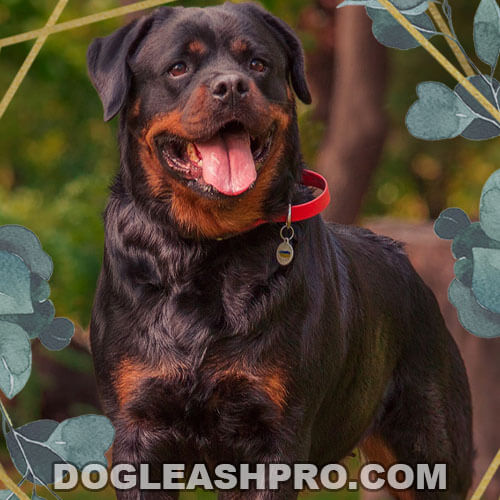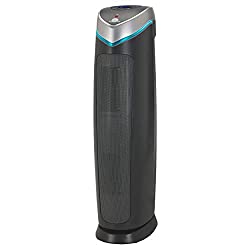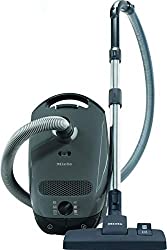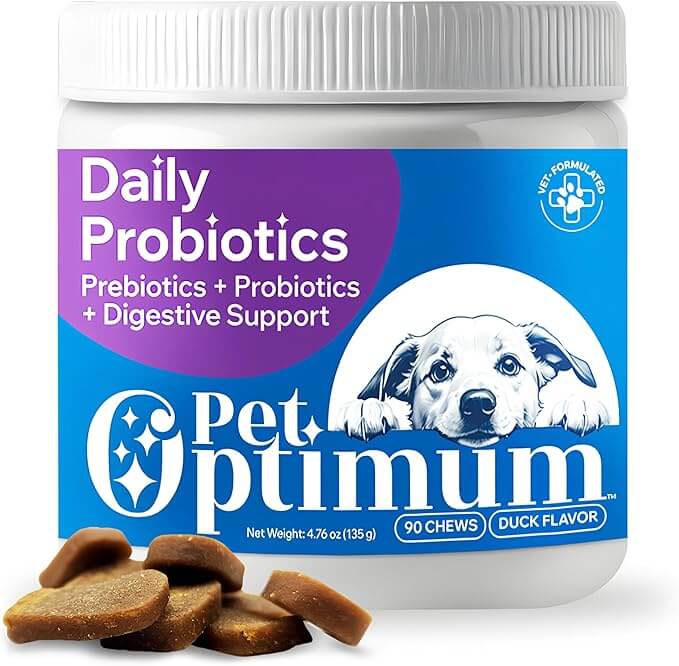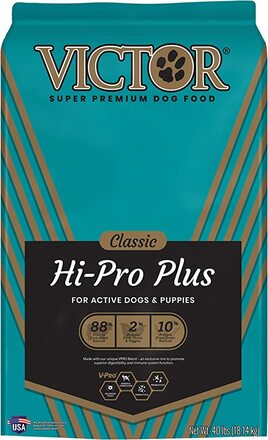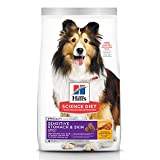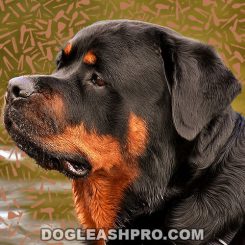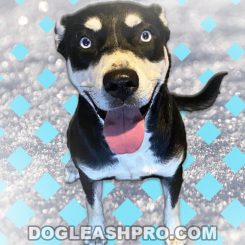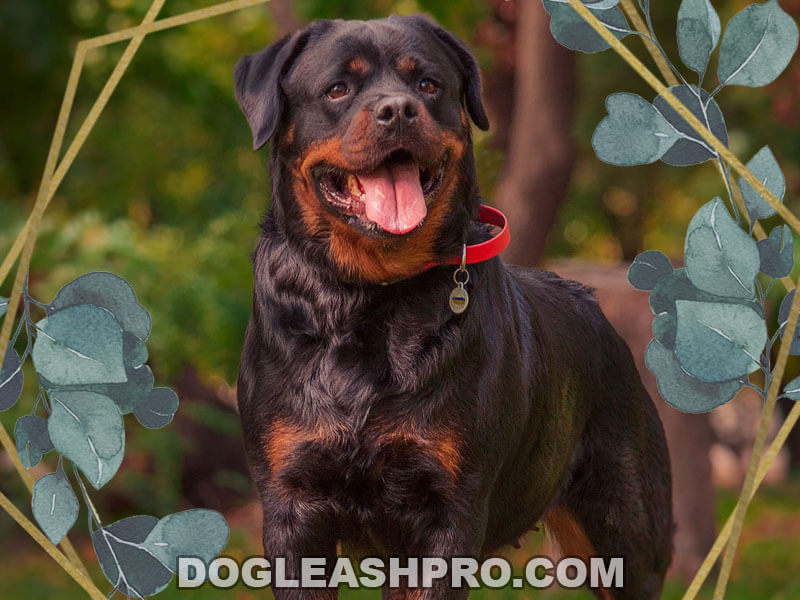
Are Rottweilers Hypoallergenic? No, Rottweilers are not hypoallergenic. Rottweilers shed moderately throughout the year which can spread dander throughout your home. They also tend to drool saliva due to their jowls or loose upper lips which can be a source of allergens. Thus, the loose fur, dander, and saliva from the Rottweiler can trigger allergic reactions in those with dog allergies.
Having a pet, like a dog or a cat can contribute to our mental and emotional well-being because of the unconditional love and companionship they give. But, it is important to note that before we introduce a new dog into our home, we should first consider if they can make us sick through allergies.
Rottweilers are double-coated dogs that can spread allergens in our home and environment. How much do Rottweilers shed their coat and how best can we mitigate the spread of allergens are questions to consider before adopting this breed.
In this article, we will discuss how Rottweilers can trigger an allergic reaction in people, and find the means to lessen these triggers in case you have decided to adopt a Rottie.
Table of Contents
Are Rottweilers Hypoallergenic? Why not?

There are two (2) main reasons why Rottweilers are not hypoallergenic.
First, they shed moderately throughout the year and shed heavily during the fall and spring seasons when they blow out their coat to adapt to changing temperatures.
Rotties generally have a smooth coat that sheds less than other breeds but they have a fair amount of undercoat around the neck and thigh area where most of the shedding occurs.
Second, Rottweilers have loose upper lips that hang down their lower jaw. This is also known as jowls or flews. Their huge heads together with their powerful jaws and relatively short snouts cause drool to accumulate in their mouths.
As a result, this can easily spread inside the home. Salivary proteins contain allergens that can trigger skin rashes and itchiness in some people. Keep reading as we will discuss this in more detail below.
Rottweiler history
The Rottweiler descended from the Mastiff dogs brought by the ancient Roman army when they were conquering Germania. These dogs became the foundation of many German dog breeds with the Rottweiler being one of them.
The Rottweiler was developed in the city of Rottweil where they were used not only to herd cattle but also utilized by butchers as protectors from bandits.
Through the years, the Rottweilers were employed in other uses such as search and rescue operations and servicing people with disabilities.
What does Hypoallergenic mean?
Dogs that are hypoallergenic means that they are less likely to cause allergic reactions in people.
We do want to point out that there really isn’t a dog that is totally 100% hypoallergenic since they all shed in varying degrees and produce some dander and saliva.
What are dog allergies? How do you know if you have dog allergies?
Dog allergies result from the proteins present in a dog’s dried skin flakes (dander), fur, saliva, and urine.
These proteins are the triggers that can cause a person to sneeze and have a runny nose. Some may also show signs of skin redness, breathing difficulties, and wheezing.
If you find yourself having any of these symptoms after petting or being near a dog, then it is a sign that you may be allergic to that particular dog.
What makes a dog hypoallergenic?
A dog is considered hypoallergenic when he sheds very minimally. That’s because dogs that shed minimally mean they do not spread too much dander.
Canines with curly coats, like the Poodle or Bichon Frise, are considered mildly hypoallergenic since their coat can trap dander. Those with less hair are also mildly hypoallergenic although the dead skin flakes (dander) can still trigger some reactions.
RECOMMENDED: Red Poodle (Complete Guide)
Are Rottweilers bad for allergies?
Rottweilers have a smooth coat that tends to shed less than the German Shepherd or Saint Bernard.
However, they have a thick undercoat, especially in the neck and thigh area which can spread dander all around your home.
Rottweiler drooling and dander levels
On a scale of 1 to 5, with 5 being the highest, the American Kennel Club (AKC) ranks the Rottweiler shedding level as a 3.
Although they have a short and smooth coat, they are double-coated with a fair amount of undercoat. When the undercoat sheds seasonally, the dander that sticks on the fur will fall out as well.
It is common for Rottweilers to drool especially the males with looser upper lips. On a scale of 1 to 5, Rottweilers could rank as high as 4. This means that you can expect some saliva to splash from their mouths every time they pant or bark.
Different types of Canine Proteins
There are approximately 7 canine protein allergens that can trigger an allergic reaction in humans. These proteins are designated serially as Can f 1, Can f 2, and so forth.
- Can f 1: most common, produced in the salivary and sweat glands, found in most dander and hair extracts from dogs.
- Can f 2: produced in the salivary glands.
- Can f 3: found mostly in the urine.
- Can f 4: produced in the salivary glands.
- Can f 5: produced in the prostate of a male dog.
- Can f 6: produced in the salivary glands.
Different people will have different reactions to each of these proteins and not everyone will be sensitive to each of the allergens.
Is a Rottweiler Hypoallergenic to you and your family?
Compared to other dog breeds, Rottweilers rank somewhere in the middle when it comes to causing allergic reactions in people.
There are three (3) things that cause the Rottweiler to not be hypoallergenic to you and your family. And, these are the following:
- Saliva.
- Dander.
- Loose fur.
Saliva can cause a rash to some people if a dog licks their skin or if a person touches a toy that has been contaminated with dog saliva.
Dander, on the other hand, can circulate in the air around your home and can easily be inhaled. Once inhaled, it can eventually trigger a sneezing fit or a runny nose.
Finally, dust and other small particles can adhere to loose fur that was shed by a Rottweiler.
So, are Rottweilers Hypoallergenic dogs?
No, Rottweilers are not hypoallergenic and are not the best option for allergy sufferers.
However, if you really insist on having a Rottweiler, one thing you can consider is to visit an allergist first. Your allergist may advise or suggest getting allergy shots or give you advice on how best to prevent attacks.
Another option is to adopt a similarly large dog, like the Standard Poodle or the Giant Schnauzer, that are known to be hypoallergenic. These dogs are not 100% allergy-safe but they shed very minimally and therefore has less tendency to spread dander in your environment.
Can you build up an immunity to dog allergies?
Some people can outgrow their allergies from dog dander but this is very rare. Allergic reactions typically worsens through greater exposure.
One long-term solution to reduce allergic triggers or help build tolerance against allergens is through immunotherapy or allergy shots. These injections, which contain trace amounts of the allergen, are generally given over a period of time to help reduce allergic attacks.
Another option to consider is to use allergy drops for those who have needle-phobia, but these are not as effective as allergy shots.
15 Tips to reduce dog allergy around your home
1. Invest in an air purifier with HEPA filter
Air purifiers with high-efficiency particulate air (HEPA) filters trap tiny particulates in the air, such as dander, loose hairs, and dust mites that can circulate around your home or surroundings.
Most air purifiers, humidifiers, and portable air conditioners come with a HEPA filter that could filter out any allergens. Some even features UV light filters to destroy germs and remove odors.
2. Vacuum frequently with a powerful HEPA filter vacuum cleaner
Regularly vacuuming your home will remove any dust including fleas and ticks. Using a vacuum cleaner with a HEPA filter has the added benefit of not re-circulating the dust into the air that regular vacuums do when it kicks up the dirt.
3. Brush your Rottweiler daily
Daily brushing can release dander including dried-up saliva that accumulated in your Rottie’s fur. Brushing them outside is preferable for this to ensure that the allergens will be kept out of your house.
4. Use the right tools
Using the right brush to groom your Rottweiler is important in order to not damage their skin and fur. Some brushes have sharp teeth or pins that could poke their skin which could lead to irritation and eventual hair loss.
You’ll want to use a slicker brush for nominal shedding throughout the year and a de-shedding tool to deal with the undercoat during heavy shedding seasons (fall and autumn).
5. Buy plenty of lint rollers
Stocking up on lint rollers is a good idea. Lint rollers are very effective in picking up lint, dander, and loose hairs from your clothing, sofa, bedding, sheets, upholstery, and other furniture.
6. Bathe your Rottweiler, but not too often!
One way to get rid of excess loose fur is through bathing. Rottweilers should be shampooed every 2 to 8 weeks depending on their activity level. You don’t want to bathe your Rottie too often because doing so could lead to dry, irritated, inflamed, and red skin and this leads to more shedding.
7. Use the right dog shampoo
When you do bathe your Rottweiler pup, be sure to use a dog shampoo that helps to reduce shedding and contains natural ingredients to ensure that their skin would not be irritated by strong, harsh, and harmful chemicals. A good dog shampoo should also be easy to rinse and enriched with omega-3 and omega-6 fatty acids to promote healthy skin and coat.
8. Wash your clothes, beddings, and covers regularly
Loose furs can easily accumulate in fabrics, so changing your beddings regularly and changing your clothes if you notice tons of fur has adhered to it can greatly reduce any allergic reaction.
9. Be selective with the type of flooring for your home
Having wood or tile flooring in your home is much more preferable than having carpeted floors where dander and fur could easily accumulate and stick around.
10. Train your Rottweiler to stay away from your bed and furniture
It is a good idea to train your Rottie not to jump onto the sofa or any other furniture in your home. Having their own chew proof dog bed would also refrain them from sleeping on your bed.
11. Nutritious and high-quality dog food is a must
A healthy body means a healthy coat and skin. Feeding your K9 friends a well-balanced and highly-nutritious diet ensures that their daily nutritional needs are met.
12. Taking the right supplements for healthy skin and coat
Antioxidants, like vitamins C and E, as well as, fish oils with omega-3 fatty acids help to improve the quality of their skin and coat.
But did you know that a healthy gut also plays a key role in maintaining a shiny coat and smooth skin?
By promoting good bacteria and aiding digestion, probiotics help your dog absorb the nutrients they need to keep their skin hydrated and their coat gleaming.
For a comprehensive solution, PetOptimum Probiotics for Dogs not only support gut health but also contribute to a healthier, more vibrant coat. Because when your dog feels good on the inside, it shows on the outside—keep their tail wagging and their coat shining with every cuddle.
13. Exercise, exercise, exercise!
We can’t emphasize this enough, but regular physical activity can help boost blood circulation to the skin and also supplies much-needed oxygen to reduce toxins in the skin. Additionally, daily exercise can help to prevent canine obesity and other obesity related health issues.
14. Bring your Rottweiler for his regular vet check-up
Annual or biannual physical checkups are necessary to learn about the state of your Rottweiler’s health. Regular health check ups also helps to detect any health issues early and prevent the health problem from getting worse.
15. Visit your allergist
Knowing the severity of your allergic reactions and letting your allergist know will allow them to plan the right treatment for you and also give you advice on how to manage your symptoms.
Rottweiler grooming requirements
Fortunately, the short coat of a Rottweiler is easy to care for. Aside from bathing and brushing which we will talk about next, owners like you will need to learn the basics when it comes to grooming a Rottweiler.
RECOMMENDED: Dog Grooming For Beginners At Home (Dos and Don’ts)
Dental Care
While it is true that dry food and dog chews are good for a dog’s teeth because these reduce tartar formation, still, nothing beats brushing your Rottweiler’s teeth with an enzymatic dog toothpaste.
It’s not uncommon for dogs to develop periodontal diseases by the time they reach three (3) years of age. These diseases can affect the other parts of the body including the heart and kidneys because bacteria can travel down from the mouth to other organs.
You can prevent that from happening if you brush his teeth at least 3 times a week by using a doggie dental kit.
Eye & Ear Care
Take your time to inspect and clean your Rottie’s eye boogies by using mild doggie wipes. If you notice any unusual eye discharge, take your Rottweiler to the veterinarian to address possible eye infections.
The same is true for the ears, you can either use doggie wipes or ear cleaning solution to flush out excess earwax and debris that can cause ear infections.
RELATED: How To Soften Dog Eye Boogers?
Nail Care
It’s best to trim your Rottweiler’s nails at least once every 2 months. If you start to hear his nails tapping against the hardwood floor or when you notice that his nails are beginning to curl, then it is time for a nail trimming.
You’ll want to start by using a dog nail trimmer. Be careful not to cut the quick, lest, it will result in bleeding. You can also opt to use a dog nail grinder if you’re having a hard time trimming his nails.
Many Rottie owners prefer using a dog nail grinder because it is more precise and features a whisper-quiet motor, which is great for dogs that are sensitive to the clipping noise.
Skin Care
Does your Rottweiler have skin rashes or hot spots? If yes, you may want a conditioning spray that helps control itchiness and improves dry skin condition.
DON’T MISS: Dog Losing Hair Around Eyes? (9 Top Reasons + What To Do)
Caring for a Rottweiler’s coat
Unless your Rottweiler constantly plays and rolls in the mud, bathing a Rottweiler should be done at least once every 6 weeks, as mentioned above.
Avoid using grooming products that are made with heavily scented ingredients because these contain strong detergents that can dry out his skin and coat.
Instead, to keep the skin and coat of a Rottweiler healthy, use organic shampoo and conditioner.
Now, in-between baths, you can maintain the cleanliness of his coat by brushing his coat at least twice a week. A slicker brush or a pin with a bristle brush are some of the great choices.
How do you know if dogs have allergies?
To know if your dog has allergies, these are the most common symptoms to watch out for:
- Non-stop scratching.
- Skin redness.
- Keeps on licking his paws.
- Hair loss.
- Ear infections.
- Sneezing.
- Diarrhea and vomiting.
CHECK OUT: Why Is My Dog Licking The Floor?
Rottweiler allergies
A Rottweiler is a healthy and robust dog breed but he is also prone in developing skin problems, including allergic reactions to a food protein and outdoor irritants like grass.
The Rottweiler allergy symptoms include redness and itching of the skin, hair loss, and in some cases, vomiting, diarrhea, and breathing difficulties.
ALSO READ: Home Remedies For Dog Scooting (10 Easy Ways That Work Fast!)
What are Rottweilers allergic to?
First, Rottweilers can be allergic to food. For example, if your Rottweiler is allergic to pork meat, he will show symptoms like gastrointestinal distress like diarrhea or chronic gas, and skin irritations.
Second, Rottweilers can be allergic to something that they inhaled or environmental irritants such as pollens and fumes in your home. The signs of inhalant allergies include sneezing, coughing, and excessive scratching.
Third, Rottweilers can also be allergic to flea infestations.
READ NEXT: Engorged Tick Fell Off Dog: Here’s What To Do!
Rottweiler skin allergies
When a Rottweiler comes in contact with an allergen, be it from food or inhalant allergens, he will begin to scratch excessively as well as bite his paws and tails to relieve itchiness. Continuous scratching results in the reddening of skin, skin lesions, and baldness.
Rottweiler skin problems
Next to allergies, Rottweilers may also suffer from other types of skin problems and one of which is a fungal infection which is called ringworms. Second, they can also suffer from skin problems caused by the bacteria Staphylococcus intermedius.
CHECK OUT: White Specks in Dog Poop (Not Moving): What Should You Do?
Rottweiler skin conditions
If your Rottweiler is suffering from skin conditions like skin allergies, yeast, or bacterial skin infections, he will scratch and scratch to the point that his skin will get inflamed. Aside from that, some of them may exhibit dry skin and dandruff.
Rottweiler dry skin
Allergies can also cause dry skin. If skin allergies are not treated, they can later develop into atopic dermatitis which is characterized by dry skin, itchiness, and inflammation.
Rottweiler dandruff
If you see specks of white particles around your home, chances are your Rottweiler has dandruff. This skin condition is caused by various factors, one of which is skin allergy.
Rottweiler food allergies
Food allergies happen when the immune system of the Rottweiler misidentifies food protein (such as soy or milk) and considers it as an invader instead of a food item.
As a result, the Rottweiler suffers from severe itching and for some, may also go through gastrointestinal distress.
You may be interested in: Can Dogs Drink Ensure? Can I Give My Dog Ensure?
Best diet for Rottweilers
To solve food allergies problems, it’s best to give your furry friends a single protein dog food to find out which food protein he is reacting to. We also recommend choosing a dog food that is low in carbohydrates to lessen stomach sensitivity.
Stay away from fillers like corn, soy, yeast, and spices that can worsen his food allergies. Instead, choose a dog food that has a good amount of fish oils because this contains fatty Omega acids that help alleviate stomach problems caused by food allergies.
You may also like: How to Get Your Dog to Eat When Sick
Best food for Rottweiler
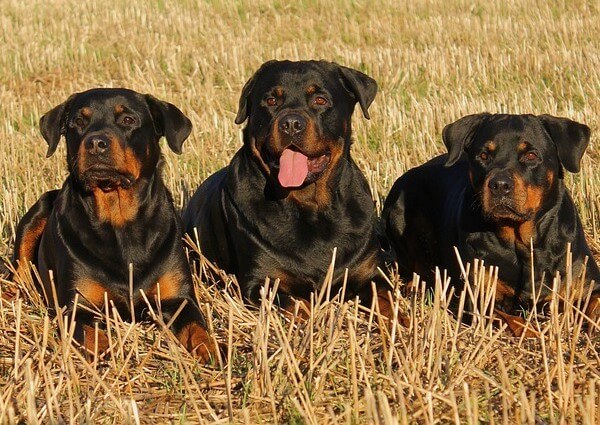
Rottweilers is an active dog breed that needs food with high amounts of protein for healthy muscles. They also require the right amount of fats as an additional source of energy. Of course, essential vitamins and minerals are needed such as omega fatty acids.
So, what is the best Rottweiler food? One of our top recommendations for the best dog food for a Rottweiler is the Victor Super Premium dog food.
This dog food for active dogs is undoubtedly our top pick because it has the right balance of protein and fats which are perfect for Rottweilers. Plus, it contains ingredients including prebiotics and probiotics for healthy digestion.
Best diet for Rottweiler puppy
All dogs including Rottweilers are carnivores, meaning, their diet should primarily be meat. Puppies require a higher amount of protein than adults because their bones and muscles are still developing.
You can feed your Rottweiler puppy dog food that indicates ‘for all life stages’ or puppy food specifically made for big dogs such as a Rottweiler.
Or you may also choose to feed the best raw food for Rottweiler puppy which includes raw chicken, beef, and innards like kidneys, and liver.
Do Rottweilers have sensitive stomachs?
Yes, some Rottweilers have sensitive stomachs and this is why choosing the right food is very important. Rottweiler stomach problems may be caused by food intolerance, say for example, if he is allergic to milk. Food allergies cause vomiting and diarrhea, and gassy stomachs.
RECOMMENDED: What Can Dogs Drink Besides Water?
Best food for Rottweiler with sensitive stomach
Rottweilers that have sensitive stomachs tend to suffer from tummy discomforts as a result of the wrong diet. Aside from food allergies, Rottweilers can be bothered by colitis which is inflammation of the colon or the large intestines. The culprits can be stress, parasites, or a change in diet.
This is why you have to be careful in selecting the right food for your Rottweiler and one such food we picked for your Rottie is the one below:
We give the Hill’s Science Diet Adult Sensitive Stomach Skin Dry Dog Food our 2-thumbs up because it contains nothing but natural ingredients such as chicken and brown rice. It is also fortified with prebiotic fiber that helps resolve the digestive problems of Rottweilers. Plus, it has added vitamin E and fatty-omega acids for beautiful skin and coat.
Supplements for Rottweilers for healthy coats and skin
Have you noticed that your Rottweiler keeps on scratching his ears and belly, and keeps on biting his paws and tails? Then, he could be suffering from skin allergies. To resolve this issue, we recommend that you speak with your dog’s veterinarian to ask for the best supplement for your pup.
Essential ingredients to combat Rottweiler food allergies
All skin problems are treatable. Aside from the medicines that a veterinarian will prescribe, owners like you can also make some dietary adjustments to address and improve the allergy issues of a Rottweiler.
| Condition | Dietary requirements and Adjustments |
| Dermatitis and chronic itching | Add vitamin E to his diet. |
| Dietary needs and adjustments | Eliminate dairy products and increase fish oil which is a good source of fatty Omega acids. |
| Crustiness and dandruff | Add Omega-3 and 6 fatty acids. |
| Scaling and dull coat | Increased Omega-3 fatty acid and vitamin E. |
| Change in coat color | Add beta-carotene and omega fatty acids. |
| Gastrointestinal signs | Increased probiotics, prebiotics, and fiber. |
Best homemade food for Rottweiler
If you’d rather cook food for your Rottweiler, you can cook meat such as beef or fish with fresh vegetables. Steaming or boiling instead of frying is the best option. Avoid salt and pepper because nothing beats the natural taste and flavor of the ingredients.
RECOMMENDED: Can Dogs Eat Brussel Sprouts? The Good and the Gas!
Hypoallergenic Rottweiler Mix
Looking for Rottweiler mixes that are low in dander and do not shed a lot? Here are some 3 Rottweiler Mixes that may catch your fancy. We cannot guarantee you 100% that these mixed breeds are hypoallergenic but if the genes of the hypoallergenic parent are more dominant, chances are they won’t cause allergic reactions in sensitive people.
- Giant Schnauzer Rottweiler Mix
- Afghan Hound Rottweiler Mix
- Rottweiler Poodle Mix
Hypoallergenic dog breed
If you love dogs but do not know which dog breeds are hypoallergenic, we’ve made a short list for you. These dogs do not produce high amounts of dander. Plus, their coats do not shed a lot, making them good canine buddies for allergy sufferers.
- Shih Tzu.
- Poodle.
- Labradoodle.
- Bichon Frise.
- Coton de Tulear.
- Chinese Crested.
So, Are Rottweilers Hypoallergenic?
If you’re attracted to owning a Rottweiler but suffer from respiratory ailments like asthma or pet allergies, a Rottweiler may not be the right canine friend for you because a Rottie is not hypoallergenic. This dog sheds moderately all year round and it gets intense during the onset of summer and winter.
Related Questions
Rottweilers are ranked as moderate and not heavy shedders.
No, Rottweilers are not good for allergy sufferers because they are moderate shedders.
A Labradoodle is the #1 hypoallergenic dog because he does not produce a high amount of dander and his coat sheds very minimally only.
Not really because their smooth coats are fairly easy to brush and do not tangle.
Labrador Retrievers, Corgis, and Chow Chows are the worst dogs for allergy sufferers.
Giant Schnauzers, Golden Doodles, and Samoyeds are big dogs that are hypoallergenic.
Afghan Hound because he produces low amounts of dander, does not drool a lot, and does not shed his long and silky hair.
DISCLAIMER: THIS WEBSITE DOES NOT PROVIDE MEDICAL ADVICE
The information, including but not limited to, text, graphics, images and other material contained on this website are for informational purposes only. No material on this site is intended to be a substitute for professional veterinary advice, diagnosis, or treatment. Always seek the advice of your veterinarian or other qualified health care provider with any questions you may have regarding a medical condition.
Resources:
https://rottweilerhealth.org/health-news/
https://www.akcchf.org/educational-resources/library/articles/Rottwiler-Update-Spring-2021-HSA.pdf

With over five years of specialized experience as an animal writer, my expertise lies in dog nutrition, health, behavior, grooming, and training. I am dedicated to delivering helpful and informative content that caters to the well-being of our furry friends. My primary goal is to empower pet owners with knowledge and ensure our canine companions thrive in health and happiness. In my free time, I love volunteering at local dog rescue centers.
